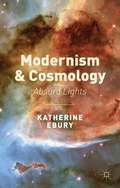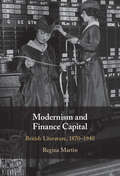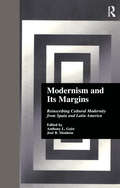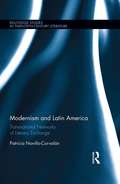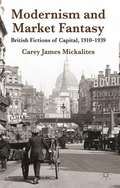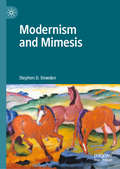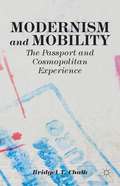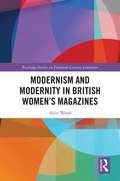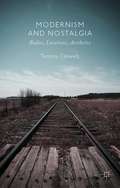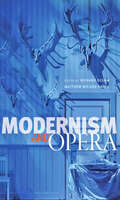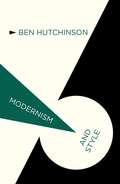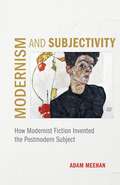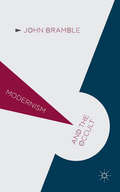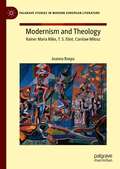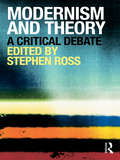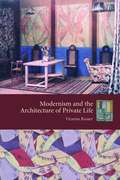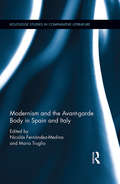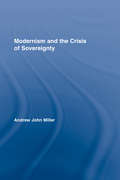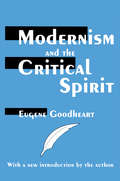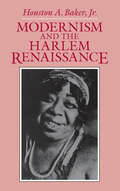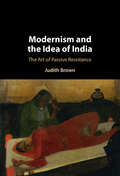- Table View
- List View
Modernism and Cosmology
by Katherine EburyThrough examining the work of W. B. Yeats, James Joyce, and Samuel Beckett, Katherine Ebury shows cosmology had a considerable impact on modernist creative strategies, developing alternative reading models of difficult texts such as Finnegans Wake and 'The Trilogy'.
Modernism and Finance Capital: British Literature, 1870–1940
by Regina MartinModernism and Finance Capital interprets modernism as a historical moment of financial crisis. It expands the definition of finance capital beyond mode of capital accumulation and value form to include a complex of historical processes during the modernist period, which includes the growth of the professional classes, the rise of the modern corporation, the economic turn toward London, and the emergence of affect as economic and literary value form. The book thereby locates the origins of twenty-first century affective economy in the turn-of-the-twentieth century modernist and financial revolutions. Scholars working at the crossroads of economic and cultural studies will find a model for how to interpret literature and other cultural artifacts as participating in economic processes of finance capital even when they do not engage explicitly with such issues.
Modernism and Its Margins: Reinscribing Cultural Modernity from Spain and Latin America (Hispanic Issues)
by José B. Monleón Anthony L. GeistThis volume represents a rereading of modernism and the modernist canon from a double distance: geographical and temporal. It is a revision not only from the periphery (Spain and Latin America), but from this new fin de si cle as well, a revisiting of modernity and its cultural artifacts from that same postmodernity. Modernism and Its Margins is an attempt at introducing different perspectives and examples in the theoretical debate, redefine dominant assumptions of what modernism-or margins-mean in our historical juncture.
Modernism and Japanese Culture
by Roy StarrsAn in-depth and comprehensive account of the complex history of Japanese modernism from the mid-19th century 'opening to the West' until the 21st century globalized world of 'postmodernism. ' Its concept of modernism encompasses not just the aesthetic avant-garde but a wide spectrum of social, political and cultural phenomena.
Modernism and Latin America: Transnational Networks of Literary Exchange (Routledge Studies in Twentieth-Century Literature)
by Patricia Novillo-CorvalánThis book is the first in-depth exploration of the relationship between Latin American and European modernisms during the long twentieth century. Drawing on comparative, historical, and postcolonial reading strategies (including archival research), it seeks to reenergize the study of modernism by putting the spotlight on the cultural networks and aesthetic dialogues that developed between European and non-European writers, including Pablo Neruda, James Joyce, Leonard Woolf, Virginia Woolf, Jorge Luis Borges, Victoria Ocampo, Roberto Bolaño, Julio Cortázar, Samuel Beckett, Octavio Paz, Carlos Fuentes, and Malcolm Lowry. The book explores a wide range of texts that reflect these writers’ complex concerns with questions of exile, space, empire, colonization, reception, translation, human subjectivity, and modernist experimentation. By rethinking modernism comparatively and by placing this intricate web of cultural interconnections within an expansive transnational (and transcontinental) framework, this unique study opens up new perspectives that delineate the construction of a polycentric geography of modernism. It will be of interest to those studying global modernisms, as well as Latin American literature, transatlantic studies, comparative literature, world literature, translation studies, and the global south.
Modernism and Market Fantasy
by Carey James MickalitesExamining work from Ford and Conrad's pre-war impressionism through Rhys's fiction of the late 1930s, the author shows how modernist innovation engages with transformations in early twentieth-century capitalism and tracks the ways in which modernist fiction reconfigures capitalist mythologies along the fault lines of their internal contradictions.
Modernism and Masculinity
by Natalya Lusty Julian MurphetModernism and Masculinity investigates the varied dimensions and manifestations of masculinity in the modernist period. Thirteen essays from leading scholars reframe critical trends in modernist studies by examining distinctive features of modernist literary and cultural work through the lens of masculinity and male privilege. The volume attends to masculinity as an unstable horizon of gendered ideologies, subjectivities and representational practices, allowing for fresh interdisciplinary treatments of celebrated and lesser-known authors, artists and theorists such as D. H. Lawrence, Ezra Pound, Henry Roth, Theodor Adorno and Paul Robeson as well as modernist avant-garde movements such as vorticism, surrealism and futurism. As diverse as the masculinities that were played out across the early twentieth century, the approaches and arguments featured in this collection will appeal especially to scholars and students of modernist literature and culture, gender studies and English literature more broadly.
Modernism and Mimesis
by Stephen D. DowdenThis book offers a bold new view of the way in which modernist fiction, painting, music, and poetry are interlinked. Dowden shows that modernism, contrary to a longstanding view, did not turn away from mimesis. Rather, modernism operates according to a deepened understanding of what mimesis is and how it works, which in turn occasions a fresh look at other related dimensions of the modernist achievement. Modernism is neither “difficult” nor elitist. Instead, it trends toward simplicity, directness, and common culture. Dowden argues that naïveté rather than highbrow sophistication was for the modernists a key artistic principle. He demonstrates that modernism, far from glorifying subjective creativity, directs itself toward healing the split between subject and object. Mimesis closes this gap by resolving representation into play and festivity.
Modernism and Mobility
by Bridget T. ChalkTracing the changing conceptions of nationality in the work of traveling writers such as D. H. Lawrence, Gertrude Stein, and Claude McKay, Modernism and Mobility argues that the passport system is an indispensable segue into discussions of literary modernism.
Modernism and Modernity in British Women’s Magazines (Routledge Studies in Twentieth-Century Literature)
by Alice WoodThis book explores responses to the strangeness and pleasures of modernism and modernity in four commercial British women’s magazines of the interwar period. Through extensive study of interwar Vogue (UK), Eve, Good Housekeeping (UK), and Harper’s Bazaar (UK), Wood uncovers how modernism was received and disseminated by these fashion and domestic periodicals and recovers experimental journalism and fiction within them by an array of canonical and marginalized writers, including Storm Jameson, Rose Macaulay, Gertrude Stein, and Virginia Woolf. The book’s analysis is attentive to text and image and to interactions between editorial, feature, and advertising material. Its detailed survey of these largely neglected magazines reveals how they situated radical aesthetics in relation to modernity’s broader new challenges, diversions, and opportunities for women, and how they approached high modernist art and literature through discourses of fashion and celebrity. Modernism and Modernity in British Women’s Magazines extends recent research into modernism’s circulation through diverse markets and publication outlets and adds to the substantial body of scholarship concerned with the relationship between modernism and popular culture. It demonstrates that commercial women’s magazines subversively disrupted and sustained contemporary hierarchies of high and low culture as well as actively participating in the construction of modernism’s public profile.
Modernism and Naturalism in British and Irish Fiction, 1880-1930
by Simon JoyceThis book argues that the history of literary modernism is inextricably connected with naturalism. Simon Joyce traces a complex response among aesthetes to the work of Émile Zola at the turn of the century, recovering naturalism's assumed compatibility with impressionism as a central cause of their ambivalence. Highlighting a little-studied strain of reflexive naturalism in which Zola's mode of analytical observation is turned upon the authors themselves, Joyce suggests that the confluence of naturalism and impressionism formed the precondition for so-called stream-of-consciousness writing. This style served to influence not only the work of canonical modernists such as Joyce and Woolf but also that of lesser-known writers such as George Moore, Sarah Grand, and George Egerton.
Modernism and Nostalgia
by Tammy ClewellThis book addresses the multiple meanings of nostalgia in the literature of the period. Whether depicted as an emotion, remembrance, or fixation, these essays demonstrate that the nostalgic impulse reveals how deeply rooted in the damaged, the old, and the vanishing, were the variety of efforts to imagine and produce the new the distinctly modern. "
Modernism and Opera (Hopkins Studies in Modernism)
by Richard Begam and Matthew Wilson SmithMany of the greatest works in the operatic repertoire bear the hallmarks of modernism.At first glance, modernism and opera may seem like strange bedfellows—the former hostile to sentiment, the latter wearing its heart on its sleeve. And yet these apparent opposites attract: many operas are aesthetically avant-garde, politically subversive, and socially transgressive. From the proto-modernist strains of Richard Wagner’s Parsifal through the twenty-first-century modernism of Kaija Saariaho’s L’amour de loin, the duet between modernism and opera, at turns harmonious and dissonant, has been one of the central artistic events of modernity. Despite this centrality, scholars of modernist literature only rarely venture into opera, and music scholars generally return the favor by leaving literature to one side. But opera, that grand cauldron of the arts, demands that scholars, too, share the stage with one another.In Modernism and Opera, Richard Begam and Matthew Wilson Smith bring together musicologists, literary critics, and theater scholars for the first time in a mutual endeavor to trace certain key moments in the history of modernism and opera. This innovative volume includes essays from some of the most notable scholars in their fields and covers works as diverse as Debussy’s Pelléas et Mélisande, Bartók’s Bluebeard’s Castle, Berg’s Wozzeck, Janáček’s Makropulos Case, Thomson’s Four Saints in Three Acts, Strauss’s Arabella, Schoenberg’s Moses und Aron, Stravinsky’s The Rake’s Progress, Britten’s Gloriana, and Messiaen’s Saint François d’Assise. A collaborative study of the ultimate collaborative art form, Modernism and Opera reveals how modernism and opera illuminate each other and, more generally, the culture of the twentieth century. It also addresses a number of issues crucial for understanding the relation between modernism and opera, focusing in particular on intermediality (how modernism integrates music, literature, and drama into opera) and anti-theatricality (how opera responds to modernism’s apparent antipathy to theatricality). This captivating book—the first of its kind—will appeal to scholars of literature, music, theater, and modernity as well as to sophisticated opera lovers everywhere.
Modernism and Style
by Ben HutchinsonModernism is fundamentally determined by its relationship to its own notions of style: oscillating between the poles of 'pure' style and 'purely' style, this traces the stylistic self-conceptualization of modernism from Schopenhauer and Flaubert in the 1850s, through Nietzsche and the symbolists in the 1880s, to the high modernists of the 1920s.
Modernism and Subjectivity: How Modernist Fiction Invented the Postmodern Subject
by Adam MeehanIn Modernism and Subjectivity: How Modernist Fiction Invented the Postmodern Subject, Adam Meehan argues that theories of subjectivity coming out of psychoanalytic, poststructuralist, and adjacent late-twentieth-century intellectual traditions had already been articulated in modernist fiction before 1945. Offering a bold new genealogy for literary modernism, Meehan finds versions of a postmodern subject embodied in works by authors who intently undermine attempts to stabilize conceptions of identity and who draw attention to the role of language in shaping conceptions of the self. Focusing on the philosophical registers of literary texts, Meehan traces the development of modernist attitudes toward subjectivity, particularly in relation to issues of ideology, spatiality, and violence. His analysis explores a selection of works published between 1904 and 1941, beginning with Joseph Conrad’s prescient portrait of the subject interpolated by ideology and culminating with Samuel Beckett’s categorical disavowal of the subjective “I.” Additional close readings of novels by F. Scott Fitzgerald, Aldous Huxley, James Joyce, Nathanael West, and Virginia Woolf establish that modernist texts conceptualize subjectivity as an ideological and linguistic construction that reverberates across understandings of consciousness, race, place, and identity. By reconsidering the movement’s function and scope, Modernism and Subjectivity charts how profoundly modernist literature shaped the intellectual climate of the twentieth century.
Modernism and The Occult
by John BrambleThis study of modernism's high imperial, occult-exotic affiliations presents many well-known figures from the period 1880-1960 in a new light. Modernism and the Occult traces the history of modernist engagement with 'irregular', heterodox and imported knowledge.
Modernism and Theology: Rainer Maria Rilke, T. S. Eliot, Czesław Miłosz (Palgrave Studies in Modern European Literature)
by Joanna RzepaThis is the first book-length study to examine the interface between literary and theological modernisms. It provides a comprehensive account of literary responses to the modernist crisis in Christian theology from a transnational and interdenominational perspective. It offers a cultural history of the period, considering a wide range of literary and historical sources, including novels, drama, poetry, literary criticism, encyclicals, theological and philosophical treatises, periodical publications, and wartime propaganda. By contextualising literary modernism within the cultural, religious, and political landscape, the book reveals fundamental yet largely forgotten connections between literary and theological modernisms. It shows that early-twentieth-century authors, poets, and critics, including Rainer Maria Rilke, T. S. Eliot, and Czesław Miłosz, actively engaged with the debates between modernist and neo-scholastic theologians raging across Europe. These debates contributed to developing new ways of thinking about the relationship between religion and literature, and informed contemporary critical writings on aesthetics and poetics.
Modernism and Theory: A Critical Debate (Routledge Studies In Human Geography Ser.)
by Stephen RossModernism and Theory boldly asks what – if any – role theory has to play in the new modernist studies. Separated into three sections, each with a clear introduction, this collection of new essays from leading critics outlines ongoing debates on the nature of modernist culture. This collection examines aesthetic and methodological links between modernist literature and theory. addresses questions of the importance of theory to our understanding of ‘modernism’ and modernism as a literary category. considers intersections of modernism and theory within ethics, ecocriticism and the avant-garde. Concluding with an afterword from Fredric Jameson, the book makes use of an innovative dialogic format, offering a direct and engaging experience of the current debate in modernist studies. Contributors include: Charles F. Altieri, C.D. Blanton, Ian Buchanan, Pamela Caughie, Melba Cuddy-Keane, Thomas S. Davis, Oleg Gelikman, Jane Goldman, Ben Highmore, Fredric Jameson, Martin Jay, Bonnie Kime Scott, Neil Levi, Anneleen Masschelein, Scott McCracken, Andrew John Miller, Stephen Ross, Roger Rothman, Morag Shiach, Susan Stanford Friedman, Allan Stoekl, Hilary Thompson and Glenn Willmott.
Modernism and the Aesthetics of Violence
by Paul SheehanThe notion that violence can give rise to art - and that art can serve as an agent of violence - is a dominant feature of modernist literature. In this study Paul Sheehan traces the modernist fascination with violence to the middle decades of the nineteenth century, when certain French and English writers sought to celebrate dissident sexualities and stylized criminality. Sheehan presents a panoramic view of how the aesthetics of transgression gradually mutates into an infatuation with destruction and upheaval, identifying the First World War as the event through which the modernist aesthetic of violence crystallizes. By engaging with exemplary modernists such as Joyce, Conrad, Eliot, and Pound, as well as lesser-known writers including Gautier, Sacher-Masoch, Wyndham Lewis and others, Sheehan shows how artworks, so often associated with creative well-being and communicative self-expression, can be re-oriented toward violent and bellicose ends.
Modernism and the Architecture of Private Life (Gender and Culture Series)
by Victoria RosnerModernism and the Architecture of Private Life offers a bold new assessment of the role of the domestic sphere in modernist literature, architecture, and design. Elegantly synthesizing modernist literature with architectural plans, room designs, and decorative art, Victoria Rosner's work explores the collaborations among modern British writers, interior designers, and architects in redefining the form, function, and meaning of middle-class private life. Drawing on a host of previously unexamined archival sources and works by figures such as E. M. Forster, Roger Fry, Oscar Wilde, James McNeill Whistler, and Virginia Woolf, Rosner highlights the participation of modernist literature in the creation of an experimental, embodied, and unstructured private life, which we continue to characterize as "modern."
Modernism and the Avant-garde Body in Spain and Italy (Routledge Studies in Comparative Literature)
by Maria Truglio Nicolas Fernandez-MedinaThis interdisciplinary volume interrogates bodily thinking in avant-garde texts from Spain and Italy during the early twentieth century and their relevance to larger modernist preoccupations with corporeality. It examines the innovative ways Spanish and Italian avant-gardists explored the body as a locus for various aesthetic and sociopolitical considerations and practices. In reimagining the nexus points where the embodied self and world intersect, the texts surveyed in this book not only shed light on issues such as authority, desire, fetishism, gender, patriarchy, politics, religion, sexuality, subjectivity, violence, and war during a period of unprecedented change, but also explore the complexities of aesthetic and epistemic rupture (and continuity) within Spanish and Italian modernisms. Building on contemporary scholarship in Modernist Studies and avant-garde criticism, this volume brings to light numerous cross-cultural touch points between Spain and Italy, and challenges the center/periphery frameworks of European cultural modernism. In linking disciplines, genres, —isms, and geographical spheres, the book provides new lenses through which to explore the narratives of modernist corporeality. Each contribution centers around the question of the body as it was actively being debated through the medium of poetic, literary, and artistic exchange, exploring the body in its materiality and form, in its sociopolitical representation, relation to Self, cultural formation, spatiality, desires, objectification, commercialization, and aesthetic functions. This comparative approach to Spanish and Italian avant-gardism offers readers an expanded view of the intersections of body and text, broadening the conversation in the larger fields of cultural modernism, European Avant-garde Studies, and Comparative Literature.
Modernism and the Crisis of Sovereignty (Routledge Studies in Twentieth-Century Literature #4)
by Andrew John MillerThis book describes how three of the most significant Anglophone writers of the first half of the twentieth century – Yeats, Eliot, and Woolf – wrestled with a geopolitical situation in which national boundaries had come to seem increasingly permeable at the same time as war among (and within) individual nation-states had come to seem virtually inescapable. Drawing on Jean-François Lyotard's analysis of the elements of performativity in J.L. Austin's speech act theory, and making critical use of Carl Schmitt’s writings on sovereignty and world order, Miller situates the writings of Yeats, Eliot, and Woolf in the context of what Lyotard describes as a "civil war of language." By virtue of its dissolution of any clear boundary between "interiority" and "exteriority," as well as by virtue of its resistance to any decisive form of resolution or regulation, this "civil war of language" takes on dimensions that are ultimately global in scope. Miller examines the emergence of modernism as bound up with a crisis of personal, political, and aesthetic sovereignty that undermined traditional distinctions between the public and private. In the process, he directly engages with the theoretical discourse surrounding the geopolitical impact of globalization and biopolitics: a discourse that is central to the influential and widely-debated work of such varied figures as Carl Schmitt, Hardt and Negri, Giorgio Agamben, and Jean-Luc Nancy. This book will be of interest to anyone concerned not only with twentieth-century literature but also with questions of nationalism and globalization.
Modernism and the Critical Spirit
by Eugene GoodheartComplaints about the decline of critical standards in literature and culture in general have been voiced for much of the twentieth century. These have extended from F.R. Leavis's laments for a "lost center of intelligence and urbane spirit," to current opposition to the predominance of radical critical theory in contemporary literature departments. Humanist criticism, which has as its object the quality of life as well as works of art, may well lack authority in the contemporary world. Even amid the disruptions of the industrial revolution, nineteenth-century humanists such as Matthew Arnold, John Ruskin, and Thomas Carlyle could assume a positive order of value and shared habits of imaginative perception and understanding between writers and readers. Eugene Goodheart argues that, by contrast, contemporary criticism is infused with the skepticism of modernist aesthetics. It has willfully rejected the very idea of moral authority.Goodheart starts from the premise that questions about the moral authority of literature and criticism often turn upon a prior question of what happens when the sacred disappears or is subjected to the profane. He focuses on contending spiritual views, in particular the dialectic between the Protestant-inspired, largely English humanist tradition of Carlyle, Ruskin, Arnold, and D.H. Lawrence and the decay of Catholicism represented by James Joyce and T.S. Eliot. Goodheart argues that literary modernism, in distancing itself from natural and social vitality, tends to render suspect all privileged positions. It thereby undermines the critical act, which assumes the priority of a particular set of values. Goodheart makes his case by analyzing the work of a variety of novelists, poets, and critics, nineteenth century and contemporary. He blends literary theory and practical criticism.
Modernism and the Harlem Renaissance
by Houston A. Baker Jr."Mr. Baker perceives the harlem Renaissance as a crucial moment in a movement, predating the 1920's, when Afro-Americans embraced the task of self-determination and in so doing gave forth a distinctive form of expression that still echoes in a broad spectrum of 20th-century Afro-American arts. . . . Modernism and the Harlem Renaissance may well become Afro-America's 'studying manual.'"—Tonya Bolden, New York Times Book Review
Modernism and the Idea of India: The Art of Passive Resistance
by Judith BrownIn his 1909 manifesto Hind Swaraj, Gandhi made an impassioned call for passive resistance that he soon retracted. 'Passive resistance' didn't, in the end, serve his overarching aims, but was troubled on multiple grounds from its use of the English phrase to the weakness implied by passivity. Modernism and the Idea of India: The Art of Passive Resistance claims that the difficulty embedded in the phrase 'passive resistance', from its seeming internal contradiction to the troubling category of passivity itself, transforms in artistic expression, where its dynamism, ambivalence, and receptivity enable art's capacity to create new forms of meaning. India provides the ground and the fantasy for writers and artists including Rabindranath Tagore, R.K. Narayan, Ahmed Ali, Amrita Sher-Gil, Virginia Woolf, and Le Corbusier. These artists and writers explore the capacities of passive resistance inspired by Gandhi's treatise, but move beyond its call for activism into new languages of art.
